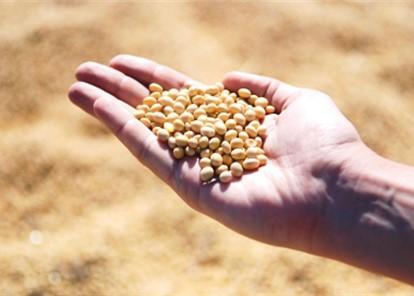
FS-1064 | June 2017
Farmer-saved Seed: What is Legal? What is Not?
Most wheat and soybean seed sold in Maryland is protected by either U.S. Patent Law or the Plant Variety Protection Act (PVPA). These protections severely limit the age-old practice of “farmer-saved seed” or prohibit it entirely, depending upon the protection the owner of the variety secures. The following will discuss the implications of Patent Law and PVPA on farmer-saved seed of wheat and soybeans.
Most Soybean Seed and Growing Share of Wheat Seed Sold in Maryland Protected under U. S. Patent Law

PATENT LAW DOES NOT ALLOW FOR SAVED SEED FOR PLANTING PURPOSES. THERE ARE NO EXCEPTIONS, INCLUDING COVER CROP SEED! Review the seed tag and container to determine if a variety (or brand) is patent protected. Look for the “Patent Number” or the statement “Patent Pending.”
Plant Variety Protection Act Gives Patent-like Protection to Owners or Breeders of a Variety, with One Major Exception
THE PVPA ALLOWS FARMERS WHO PURCHASED PVPA-PROTECTED SEED TO SAVE SEED FOR PLANTING PURPOSES ON THEIR OWN HOLDINGS. NO SALES, TRANSFERS, TRADING ETC OF SEED IS ALLOWED. Review the seed tag and container to determine if the variety (or brand) is protected. Look for the statement “U.S. Plant Protected Variety – Unauthorized Propagation Prohibited.” It is estimated that less than 25% of the wheat varieties (or brands) sold in Maryland are protected under PVPA.
Grain Dealers Increasingly Selling Seed for Planting Purposes
As the demand for “cover crop seed” has grown, a numbers of grain dealers have been selling wheat out of the bin for planting purposes. Since most wheat varieties (or brands) are either “Patent Protected” or “PVPA,” selling wheat for planting purposes violates one or both of the plant protection laws. The principle of “patent exhaustion” nor the reasoning that “it’s only cover crop, it will be killed in the spring” are not a defense to avoid the law. U.S. Patent Law and the PVPA are quite clear that no propagation is allowed. It is also illegal to label Patent- or PVPS-protected seed as “VARIETY NOT STATED,” regardless of its intended use.
Companies Invested Heavily in New Technologies
Without patent and plant variety protection, companies would not be able to recoup the enormous investments in products and continue to bring new technology to the marketplace.
Example of PVPA Protected Seed Tag

Example of Patent Protected Seed Tag

DALE MORRIS
dale.morris@maryland.gov
ROBERT KRATOCHVIL
rkratoch@umd.edu
PAUL GOERINGER
Extension Legal Specialist
lgoering@umd.edu
This publication, Farmer-saved Seed: What is Legal? What is Not? (FS-1064) is a part of a collection produced by the University of Maryland Extension within the College of Agriculture and Natural Resources.
The information presented has met UME peer-review standards, including internal and external technical review. For help accessing this or any UME publication contact: itaccessibility@umd.edu
For more information on this and other topics, visit the University of Maryland Extension website at extension.umd.edu
University programs, activities, and facilities are available to all without regard to race, color, sex, gender identity or expression, sexual orientation, marital status, age, national origin, political affiliation, physical or mental disability, religion, protected veteran status, genetic information, personal appearance, or any other legally protected class.